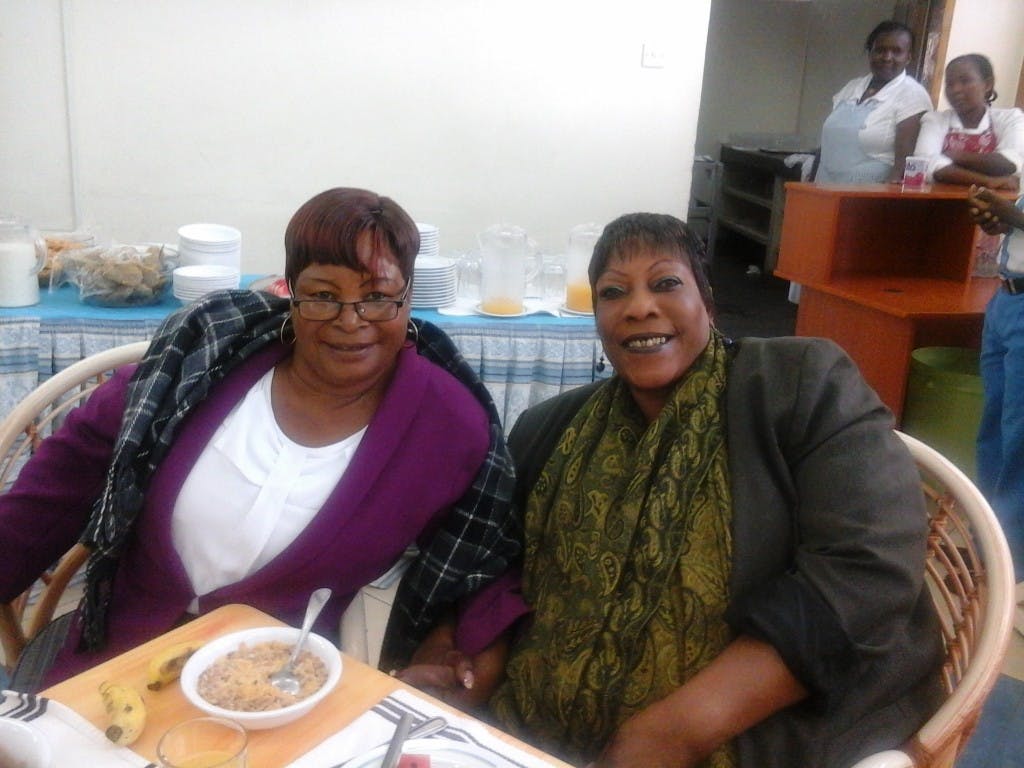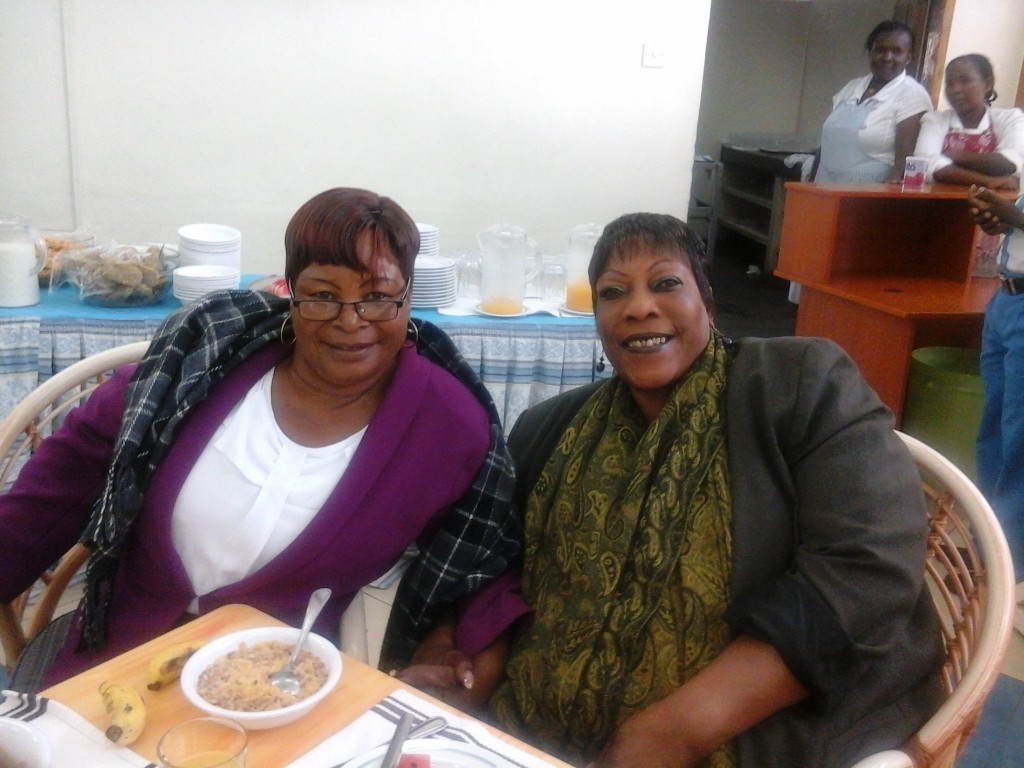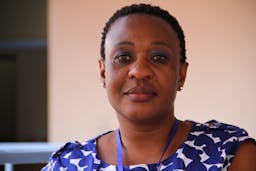The personal is political! Profiling Zimbabwe women political leaders at the UN Women-ACTIL training, Kenyatta University, Kenya
Jan 21, 2015
Story


Honourable Dorothy Apronia Kadungure, MP (Mashonaland Central ) was born in 1950 and is a mother of five. Politics molded Dorothy since her teenage days living with an aunt in Highfield, a high density suburb in Harare where the trajectories of African nationalism can be traced back to. When schools were closed because of political violence Dorothy relocated to her rural home in Rushinga to enrol back into school. This period coincided with the times freedom fighters recruits were crossing over to Mozambique for training. School was disturbed again as she joined the vanguard to provide support services to the comrades in the bush.
“We were called 'chimbwidos', and we received training in the bush on how to protect ourselves against the Rhodesian Front bombings while providing support to the fighters as cooks, and as carriers of food and other necessities. We were also trained on how to keep watch and vigilance against the enemy camp. War was difficult but we took it down like our staple food sadza because we wanted freedom from colonial rule. We were tired of being discriminated against by foreigners in our own country.”
After independence in 1980 Dorothy did not rest, but started to work herself into politics through the Zanu PF party structures starting at grassroots level.
“I never lost the sense of my role in politics after all I had gone through during the war. I wanted to remain on the ground helping women and children in my rural community to get government recognition. I believe in my party and this is linked to my sense of a black Zimbabwean's history. Zanu PF taught me to be strong and to stand for what is my own, my country. It was easy for me because my area was pre-dominantly Zanu PF. I started mobilising at branch level as Political Commissar and moved to district level as Chair-lady and then to Province where I held so many posts. I then rose to National secretary for Education in the Zanu PF Women’s League. Through my hard work and unwavering position I am now in parliament via the women’s quota system and I am thankful to all women of Zimbabwe who influenced the Constitution successfully for women’s quotas. I am doing potato farming and rotational savings schemes with women in my constituency. I believe women must own farms and fields to ensure food security. We have a scheme where we save money and buy groceries to provide basic food packages every month to needy female headed households. Women in my constituency are motivated to work hard, and many of them now own stalls in flea markets. They all target to go into the transport business and a few have acquired taxis that are plying the Harare-Rushinga routes from these savings schemes. All women should unite for a common cause. Unless we raise ourselves up like men we will never catch up with the empowerment agenda. Women must not wait for men to support them; we must prove to the world that we are able. I am a widow, my husband died in 1994 but I have sent my children to school through hard work.”
Honourable Fanny Chirisa MP, MDC-T (Manicaland) is a product of the Zimbabwe women’s movement, where she is affectionately known as ‘Sissy Fanny’. Sissy Fanny left Save the Children in 1997 to join the Zimbabwe Women’s Resource Centre and NETWORK (ZWRCN) as Linkage Programme Officer connecting women parliamentarians with women in the constituencies.
"There were only twenty-two women in parliament then, twenty-one from Zanu PF, and only 1 independent MP, Margaret Dongo. We provided them with skills in public speaking, confidence building and deportment. We identified women animators in the constituencies to provide all needed support to the parliamentarians, and indirectly we were also capacity building rural women for political engagement. Through funding form donors we bought bicycles for the animators and this increased mobility for the women from one place to another during execution of the duties.
The Women in Politics Support Unit (WIPSU) was formed in 2001 and I was approached by its board to join the team as Programme Officer. There were only three staff members then and we started work with thirteen women parliamentarians six from Zanu PPF and seven from MDC. At this stage we started feeling the pain of working with women from different political parties. The women did not see eye to eye because of political party divisions. It was easy working with them in 1998 at ZWRCN when they were all from one political party, and although Margaret Dongo was there as an independent candidate she did not present much of a threat because she was only one and she was also formerly Zanu PF. Women politicians can be a headache but we worked with them in their diversity despite the challenges and for me this is an achievement. There would always be fragmentations along political party lines but also along class and positions in the parties. We worked through our borrowed strategies from other best practices in the Region, especially our South African (SA) neighbour where women formed the women’s caucus to mitigate the problems of violence between the African National Congress (ANC) and the Inkatha Freedom Party (IFP). We organised a trip to SA with women representatives from both Zanu PF and MDC to learn the best practices. We came back and formed the Zimbabwe Women’s Caucus (the women’s caucus).
Surprisingly WIPSU is now being side-lined and credibility is now is only going to parliament for the work of the women’s caucus. I am however happy that we have achieved our goals. Recognition is better than being ignored but scoring for women’s empowerment is best. In all my work with civil society I have learnt that an enabling environment is key in creating security for women especially in the rural areas, and also in ensuring women’s active participation in politics. I rose through the ranks in WIPSU, and did a lot of political work with the women. In 2011 I encountered health problems and had to spend weeks on end at the avenues clinic suffering from high blood pressure and painful legs. Burn out is one of the major challenges posed by political activism. Donors maybe upfront in supporting the work of institutions of politics, but may not understand the value of investing in the well-being of activists, yet without women’s healthy bodies there can never be women’s political organising work.
In the Constitution making process I worked with WIPSU to participate in the constitution making process as part of COPAC, and we managed to make sure women’s issues were taken on board. Women’s organisations and women politicians came together and we came up with our issues as a united front regarding enshrining women’s rights in the Constitution, and I was part of the G20 that worked 24/7 with the female drafters to ensure our issues were included. As women we celebrate the Constitution because 75% of our issues are in and we hope the government will not fail us in implementing them. In the Zimbabwe Constitution there is a quota system of 60 seats reserved for women, and this is reason why I am in parliament today. However, I was supposed to go through a political party structure to be recognised for this benefit so I applied through the MDC-T party structures. I am now a politician, but still faced with some challenges because I come from civil society and because of this people find it hard to trust me. Experience has taught me that women can be used against each other by male dominated structures. In my own province women were influenced to reject me and I am working hard to help the women see that I am not a threat. I am working to get a constituency in Manicaland and I am hopeful one day the challenges will end.
The UN Women Zimbabwe Country Office’s Gender, Peace and Security project responds to the provisions outlined in the UN Security Council Resolutions on Women, Peace and Security that provide a comprehensive political framework within which women’s protection and their role in conflict prevention and resolution can be addressed. Against this background, UN Women Zimbabwe put in place a comprehensive and elongated 3 Level Course on Leadership, Conflict Analysis and Management for 30 women political leaders from ZANU PF and the two MDC formations. Levels I and II were successfully completed in Zimbabwe and the current Level III training being held at UN Women ACTIL in Kenya is the culmination of this process.
The training has provided shared platform for women leaders and politicians to consistently enhance their skills by reflecting on their practice and experience. UN Women remains cognisant of the outstanding challenges that curtail women’s effective participation in politics, leadership and governance. Firstly, women's political participation remains a gendered process which requires female candidates to devote a significant amount of energy, resources and time, apart from the reality of dealing with internal party politics and already existing challenges of gender discrimination. In Zimbabwe partisan politics and deeply politicised violence have left women fragmented and weakened by distrust and fear. By providing safe spaces for women to dialogue and mend their broken relationships, UN Women is giving a human face to peace and security through responding to the insecurities women in politics experience on personal, professional and public levels. Women can only influence a shift of mind-sets in patriarchal men by firstly changing the way they relate to each other as fellow women, and also by engaging alternative forms of mobilising. Prioritising the wellbeing of individual women is essential for nurturing stronger organisations and catalysing movements for real, sustained change. This process is imbued with an understanding of how power and patriarchy marginalize women and how alternative approaches can inspire, unite and transform (see also www.jass.org).




